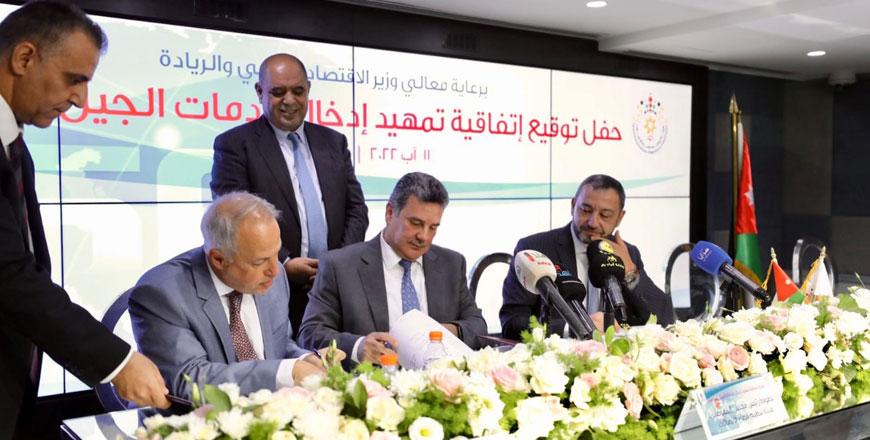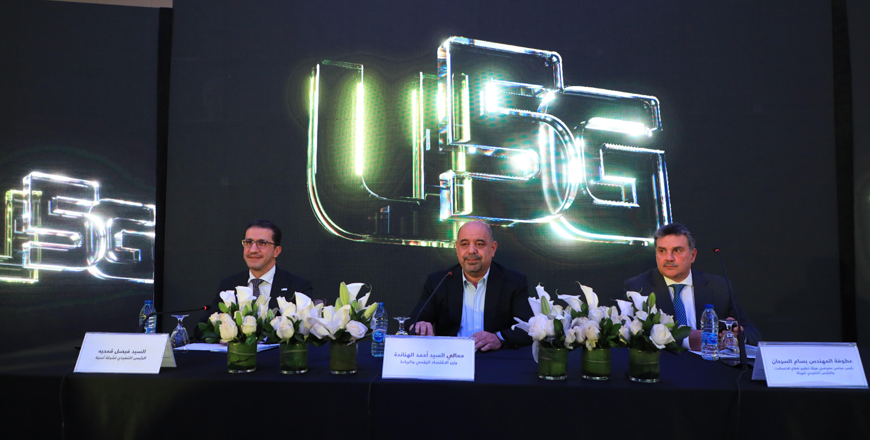You are here
TRC signs agreements with Orange, Umniah to introduce 5G services
By Maria Weldali - Aug 11,2022 - Last updated at Aug 11,2022

Minister of Digital Economy and Entrepreneurship Ahmad Hanandeh presides over the signing of an agreement between the Telecommunications Regulatory Commission and two telecom operators, Orange and Umniah, in preparation for the introduction of 5G services in the Kingdom, on Thursday (Petra photo)
AMMAN — The Telecommunications Regulatory Commission (TRC) on Thursday signed an agreement with two operators of communication services, Orange and Umniah, in preparation for the introduction of 5G services in the Kingdom.
The signing ceremony was held at TRC headquarters in Amman, to achieve the objectives laid down previously by the commission, which included upgrading competitive and investment capacities of the telecommunications sector in Jordan, and developing the infrastructure of communication networks.
Attending the ceremony, Minister of Digital Economy and Entrepreneurship Ahmad Hanandeh stressed the importance of the telecommunications industry, a significant contributor to Jordan’s economic growth.
“Internet usage in Jordan has doubled,” the minister said. He pointed out that in 2011, local Internet penetration was nearly 100 terabyte (TB), then 7,000 TB in 2020, and has reached 12,000 TB only in the first quarter of 2022.
“In 2021, the revenues of telecommunications companies in Jordan accounted for only 40 per cent of their revenues in 2010,” according to the minister.
He noted that the total capital investment in the local telecommunications industry is around JD2 billion, which reflects the fact that there is a significant decline in profits.
The stimulus package, which comes within the agreement, includes extending the duration of telecommunications carriers’ licences up to 10 years, reconciling pending issues, achieving technology neutrality, and providing motivational discounts when buying cellular frequencies, as well as providing licences for 5G, according to Hanandeh.
Chairman of TRC’s board of commissioners Bassam Sarhan, in his remarks, said that “licensing 5G services is an urgent national imperative, which is expected to have a clear, positive impact on the national economy”.
The government recognises the importance of digital transformation as a primary driver for social and economic development, he added.
He pointed out that the stimulus package the Cabinet endorsed has come to empower the telecommunications industry and develop the infrastructure that is necessary for introducing 5G services and achieving digital transformation of the public and private sector.
Additionally, Sarhan said that the findings of several international studies show that the introduction of 5G services accelerates production processes, develops new business models and enables innovation and entrepreneurship.
A recent study conducted by the TRC has revealed that there is an increasing use of data, and the strain on the current communications infrastructure has led to a growing number of complaints from service recipients.
Introducing 5G services would increase the number of mobile lines to reach about 24 million by 2030, Sarhan stated. He added that the new service would also lead to growth in revenues of telecommunications companies, to reach JD1.1 billion, compared with the JD750 million in the case that 5G services were not included.
In accordance with the agreement terms and in light of companies’ fulfilment of the commitments in the agreement within a month of the signing date, the commission will grant the licensees the 5G frequencies, where each licensor will be committed to launch the 5G services commercially in a period of no more than 18 months as of the license date, the Jordan News Agency, Petra, reported.
Each licensor will also be committed to cover the Kingdom’s main regions, especially city centres and industrial and commercial areas within three years as of the date of license.
Each licensor will also be committed to provide the 5G services to no less than 50 per cent of the Kingdom’s population, in a period that does not exceed four years of the license date, as well as increasing the covering rate by about five per cent annually until reaching a percentage of no less than 75 per cent of the Kingdom’s population.
The government, represented by the TRC, will receive a share in revenues of 10 per cent of the 5G services and applications that are provided by the licenced companies.
Related Articles
AMMAN — Umniah has announced the launch of its 5G services in the Kingdom during a press conference on Wednesday, making it the first
AMMAN — Revenues of the mobile phone operators in the Kingdom (Zain, Orange and Umniah) reached some JD673 million in 2021, compared with JD
AMMAN — Telecom operator company Umniah on Monday paid JD71 million in fees for a frequency bundle in the domain of (10+10) MHz to provide F

















